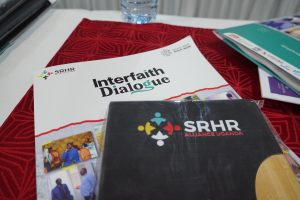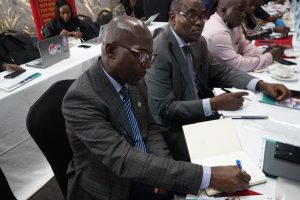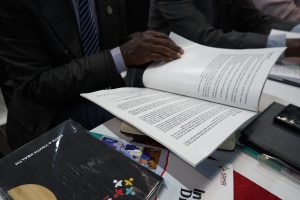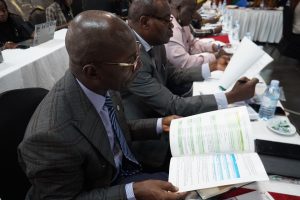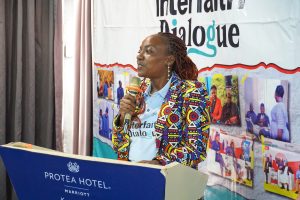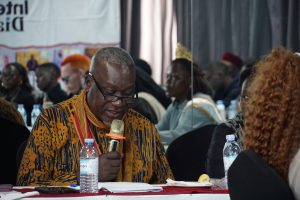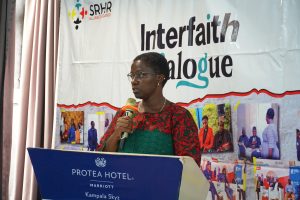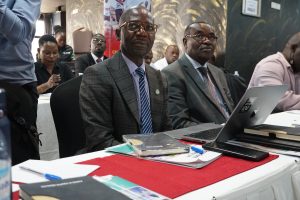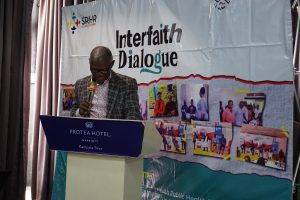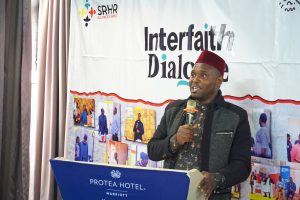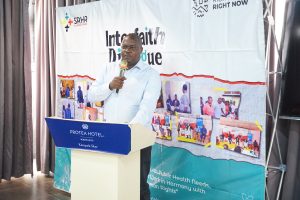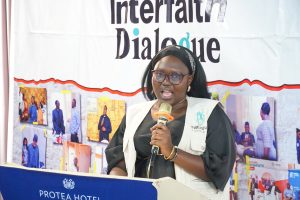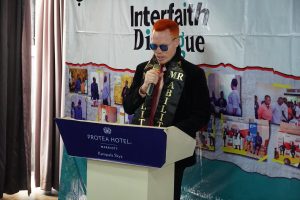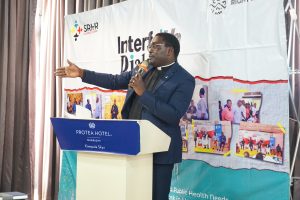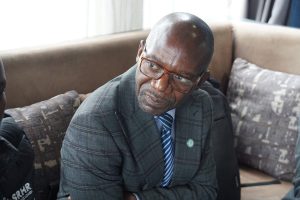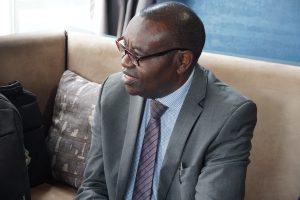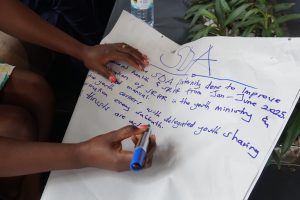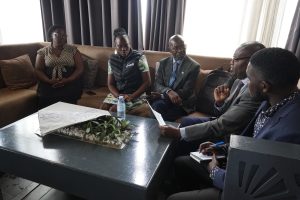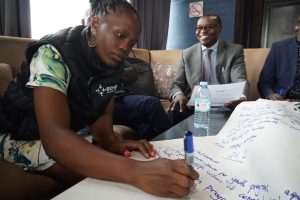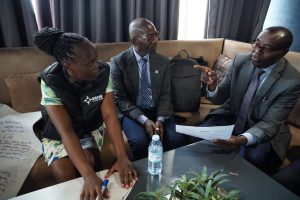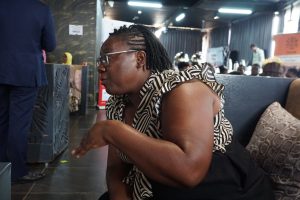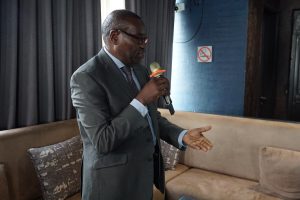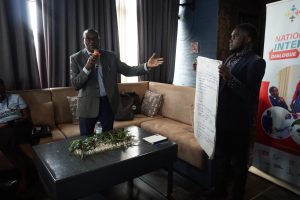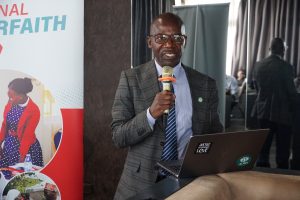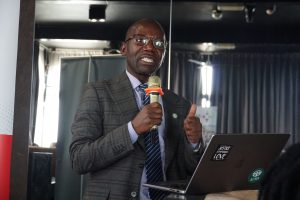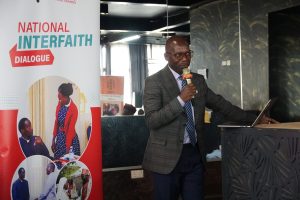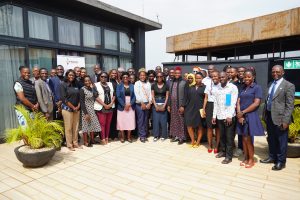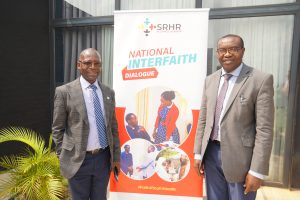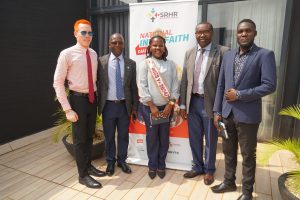ADRA Uganda’s Country Director Elder John Mwanza and pastoral leadership Pr. Samuel Kizito recently participated in a transformative Inter-Faith Dialogue Conference focused on addressing the critical adolescent health challenges facing Uganda today. The conference brought together religious leaders, healthcare professionals, youth advocates, and community stakeholders to explore faith-informed solutions to pressing SRHR issues.
Opening the Dialogue: Understanding Uganda’s Youth Crisis
The conference opened with compelling insights from Dr. Mondo Kyateka, who presented sobering statistics that set the stage for urgent action. Africa’s population has surged from 477 million in 1980 to 1.55 billion today, with Uganda experiencing unprecedented demographic challenges:
- 50% of pregnancies in Uganda are unplanned
- 70% of Uganda’s population is under 30 years old
- Teenage pregnancies increased significantly during COVID-19 school closures
- The poor are having more children than they can afford to support
Dr. Kyateka’s presentation highlighted a fundamental question: “People have many children, but can they afford to care for so many?”
Expert Insights on Adolescent Health Challenges
Dr. Viola N. Nyakato delivered a powerful presentation on adolescent health, emphasizing the need to transform family structures and parenting approaches. Her research revealed critical gaps in sexual education and support systems:
- HIV and STI information is largely absent from sexual education curricula
- 29% of Ugandan households are female-headed
- Boys and girls frequently drop out of school upon becoming parents
- 85% of children receive sexual health information from media rather than proper education
- Only 31% of sexual health information comes from schools
- 90% of 10-14 year-olds don’t use protection
Dr. Nyakato stressed that addressing these issues requires viewing them not just as gender problems, but as comprehensive family and community challenges requiring access to SRHR information and emotional support.
Faith Leadership Perspectives
Sheikh Obilan Abubakar Umar provided crucial Islamic perspectives, noting that while 99% of Ugandans are religious, many religious leaders continue preaching approaches from 50 years ago. He advocated for “dynamic theology” where religious texts serve as frameworks that leaders must adapt with contemporary relevance to effectively reach today’s population.
His powerful reminder echoed Napoleon’s words: ‘The world suffers a lot. Not because the violence of bad people. But because of the silence of the good people.’
Voices of Experience: Youth Testimonials
The conference featured moving testimonials from young people sharing their lived experiences:
- Shanurah Jimbo (UNYPA – Y+ Queen Uganda) shared her journey living with HIV, facing stigma and discrimination, and emphasized that religious leaders should ask “How are you?” rather than simply preaching
- Shadrack Magara, author of “Living Lies,” discussed prison experiences and post-incarceration stigma
- Ameede Loyce Charity advocated for inclusion and acceptance of people with hearing disabilities
- Mogami Moses emphasized that HIV status shouldn’t limit educational opportunities
- Elijah A. Reagan Yunik (“Mr. Ability Uganda”) spoke about people with disabilities and albinism
ADRA Uganda’s Strategic Response: “Adolescents ARE Uganda”
ADRA Uganda’s Country Director delivered a compelling presentation titled “Adolescents are Uganda,” highlighting both the crisis and ADRA’s comprehensive response strategy.
The Reality We Face
With over 30% of Uganda’s population being adolescents, the statistics in Northern Uganda and Karamoja are particularly alarming:
- 22% of girls aged 15-19 have begun childbearing
- Over 34% have experienced physical violence
- Health systems remain underfunded
- Sexuality continues to be stigmatized
- Early marriage persists as a survival tactic
As our Country Director powerfully stated: “In a nation of promise, our girls bleed in silence, our boys drown in anger and alcohol, and our systems… are absent.”
ADRA’s Faith Pathway: Vision 2030
ADRA Uganda has positioned faith-based engagement as central to our SRHR strategy, working with 150 interfaith leaders representing Muslim, Catholic, Born-Again, Orthodox, Hindu, Bahá’í, and Seventh-Day Adventist communities.
Our Key Initiatives Include:
- Mobile SRHR clinics embedded in churches, mosques, temples, and schools
- Reusable sanitary pads micro-enterprises empowering girls economically and hygienically
- Youth-driven digital platforms providing confidential, localized information in Acholi and Ngakarimojong
- Peer educator-led social enterprise models with revenue reinvested into health access
Measurable Impact:
- Adolescent SRHR access increased from 21% to 23% (2023-2024)
- Youth-friendly services rose from 58% to 97% in the same period
The Divine Call for Justice
Our Country Director emphasized that addressing SRHR issues is fundamentally about justice across all faith traditions:
Scriptural Foundations:
- Islam (Qur’an 4:135): “O you who believe, stand out firmly for justice…”
- Hinduism (Bhagavad Gita 4:7-8): “Whenever injustice prevails… I appear to uphold righteousness.”
- Bahá’í Faith: “The best beloved of all things in My sight is Justice…”
- Christianity (Micah 6:8): “Act justly, love mercy, walk humbly…”
As emphasized in the presentation: “Justice is not Western. Justice is not political. Justice is divine.”
A Sacred Commitment: The Interfaith SRHR Compact
The conference concluded with a powerful call for an Interfaith SRHR Compact—a living covenant of courage, compassion, and collective voice among faith communities.
The closing challenge resonated deeply: “If we do not act—who will? If the people of God, in all our traditions, do not rise to defend His children—who are we?”
The call to action was clear:
- Rise not just in prayer, but in purpose
- Rise not only as priests and imams, but as protectors of the vulnerable
- Rise as guardians of justice, of girls, of truth, of SRHR
Moving Forward Together
This Inter-Faith Dialogue Conference marked a pivotal moment in Uganda’s approach to adolescent health challenges. ADRA Uganda remains committed to leading faith-based SRHR initiatives that honour both our spiritual convictions and our moral obligation to protect and empower Uganda’s youth.
As our Country Director powerfully concluded: “The church may lose members. The mosque may lose donations. But if we lose our voice for justice—we lose God.”
Through continued collaboration with interfaith partners, innovative programming, and unwavering commitment to justice and compassion, ADRA Uganda will continue advancing comprehensive adolescent health solutions that transform communities and save lives.
